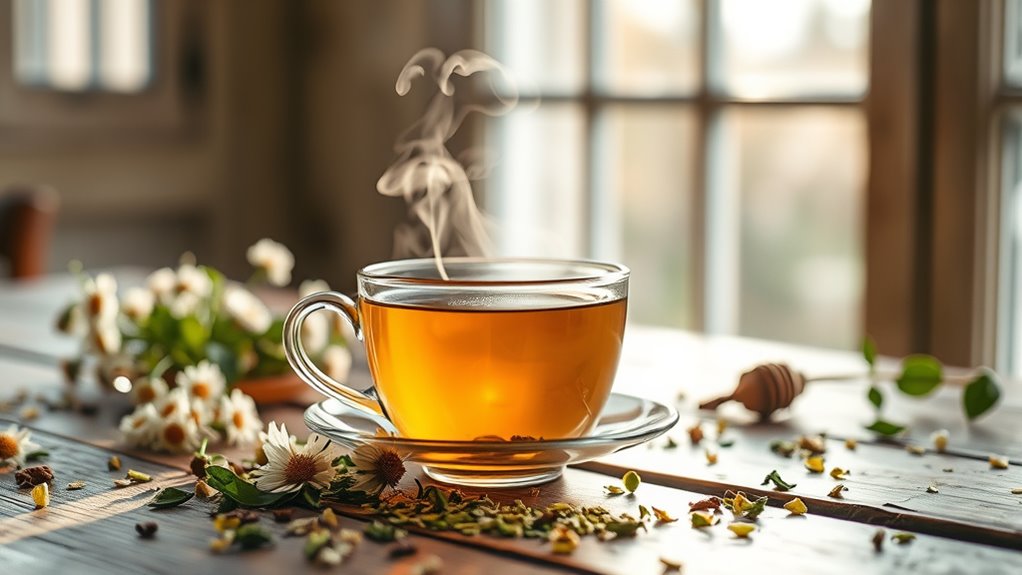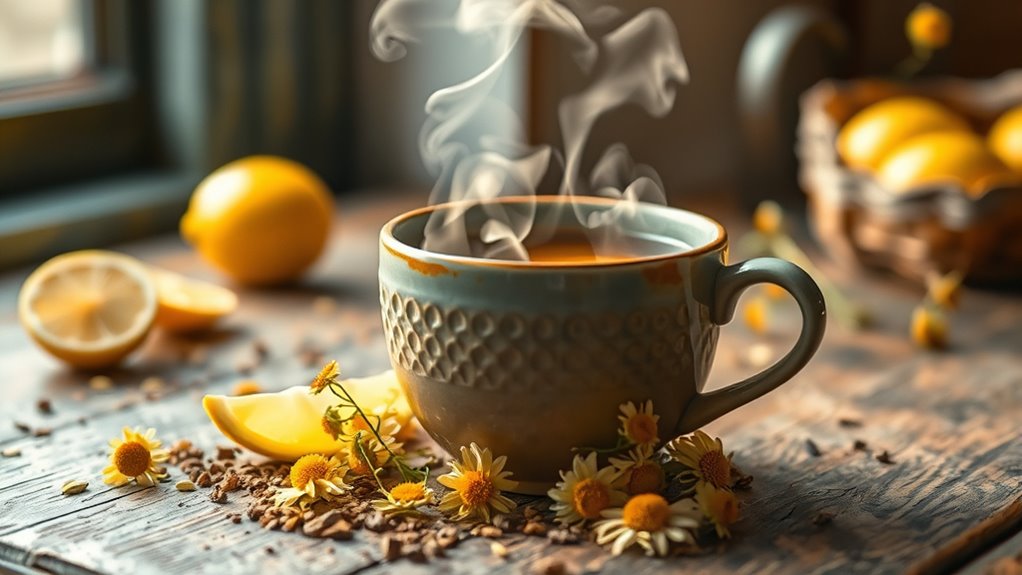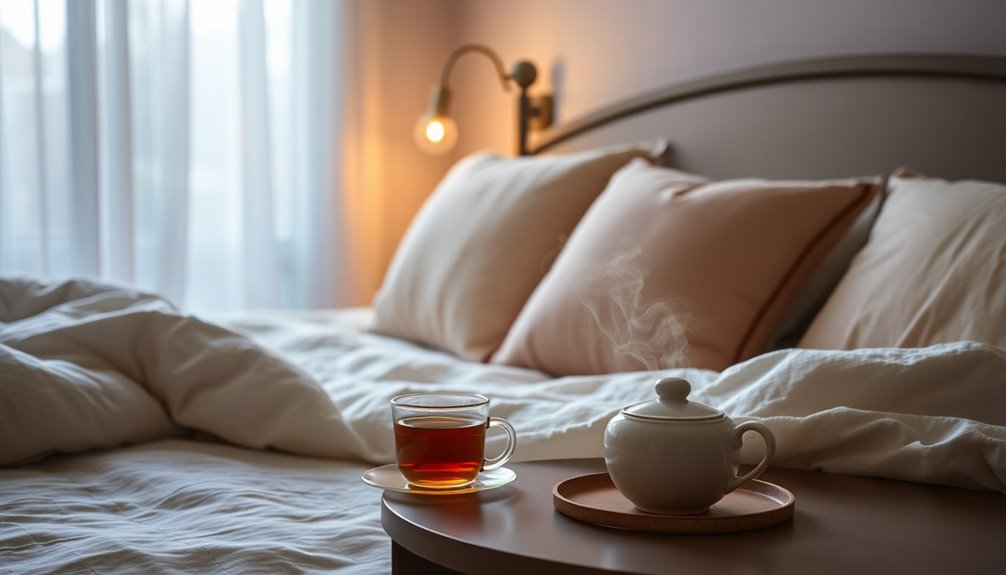Drinking herbal teas like chamomile, lavender, and lemon balm can help you relax and lower cortisol levels naturally, making them an effective tool for managing stress. While traditional teas with caffeine boost alertness temporarily, too much caffeine may raise stress hormones. Timing your tea consumption matters; herbal teas in the evening promote better sleep and calmness. Keep an eye on how caffeine affects you, and if you’re curious about more ways to balance your cortisol, there’s helpful info ahead.
Key Takeaways
- Herbal teas like chamomile and lavender naturally promote relaxation and can help lower cortisol levels.
- Tea consumption influences cortisol production; herbal teas support stress reduction without increasing cortisol spikes.
- Caffeinated teas may temporarily boost alertness but can raise cortisol if consumed excessively, impacting stress management.
- Drinking herbal or low-caffeine teas in the evening enhances relaxation and supports cortisol balance.
- Incorporating adaptogenic herbal teas can further aid the body’s ability to regulate cortisol naturally.

Tea has long been celebrated for its calming effects, but recent research suggests it may also influence cortisol levels, the hormone linked to stress. When you sip tea, you’re not just enjoying a comforting ritual—you could be actively helping your body manage stress responses. Different types of tea offer unique herbal benefits, with some containing compounds that may help lower cortisol, while others’ caffeine effects warrant careful reflection. Understanding how these factors interact can help you make better choices for stress management.
Herbal benefits are a key part of why tea can be so soothing. Herbal teas like chamomile, lavender, and lemon balm are known for their calming properties, which can help reduce cortisol levels naturally. These herbs contain antioxidants and phytochemicals that promote relaxation and ease anxiety. Drinking herbal tea regularly may support your body’s ability to handle stress more effectively, especially during hectic days. Their gentle, natural compounds work synergistically to calm your nervous system, making them a popular choice for stress relief.
Herbal teas like chamomile, lavender, and lemon balm naturally promote relaxation and help lower cortisol levels.
However, caffeine effects are equally important to weigh. Many traditional teas—black, green, and white—contain caffeine, which is a stimulant that can temporarily boost alertness but may also increase cortisol if consumed in excess. If you’re sensitive to caffeine or prone to anxiety, drinking high-caffeine teas might inadvertently raise your stress hormones rather than lower them. Moderation is key; opting for lower-caffeine varieties or herbal infusions can help you enjoy the benefits of tea without triggering unwanted cortisol spikes.
You might find that the timing of your tea consumption makes a difference, too. Having herbal tea in the evening can promote relaxation and better sleep, which are essential for cortisol regulation. Conversely, drinking caffeinated teas early in the day can give you a mental boost without disturbing your natural stress hormone rhythms. Remember, the herbal benefits of certain teas can provide a gentle, sustained calming effect, while excessive caffeine effects can counteract those benefits by elevating cortisol levels.
Additionally, choosing teas with adaptogenic properties may further support your body’s stress response by helping to balance cortisol levels naturally.
Frequently Asked Questions
Does Tea Affect Cortisol Levels Differently for Men and Women?
You might wonder if tea affects cortisol levels differently for men and women. Due to hormonal differences, gender-specific responses can occur, influencing how your body reacts to tea’s compounds. These hormonal variations, like estrogen and testosterone levels, may cause distinct effects on cortisol regulation. So, while tea can help manage stress, its impact may vary based on your gender-specific responses, making personalized approaches important.
Can Drinking Tea Replace Other Stress Management Techniques?
Drinking tea alone shouldn’t replace proven stress reduction techniques. While tea offers calming effects and can complement your stress management routine, it’s not a substitute for methods like exercise, mindfulness, or adequate sleep. For effective stress relief, consider tea as an addition to your tea alternatives, enhancing relaxation rather than replacing those essential practices. Incorporate a variety of strategies to better manage stress and improve overall well-being.
Are Certain Types of Tea More Effective at Reducing Cortisol?
Did you know that green and chamomile teas have been shown to lower cortisol levels by up to 20%? Certain types of herbal infusions, like chamomile or passionflower, are more effective because of their antioxidant properties. These antioxidants help reduce stress hormones, making them a great natural option for calming your mind. So, choosing teas rich in antioxidants can boost your stress relief efforts naturally.
How Much Tea Should I Drink to See Cortisol Benefits?
When considering tea consumption for cortisol benefits, there’s no one-size-fits-all dosage. To see potential effects, aim for about 2-3 cups daily, following general dosage guidelines. Focus on consistency rather than large amounts, as regular tea intake may support stress reduction over time. Remember, individual responses vary, so listen to your body and consult a healthcare professional if you have concerns about your tea consumption and cortisol levels.
Are There Any Risks Associated With Drinking Large Amounts of Tea for Stress?
Drinking large amounts of tea is like riding a rollercoaster—exciting but risky. You might experience increased caffeine sensitivity, leading to jitters or sleep issues, especially if you’re prone to anxiety. Plus, herbal teas can interact with medications, causing unforeseen side effects. So, moderation is key. Be mindful of your body’s response, and consult a healthcare professional if you notice adverse effects from excessive tea consumption.
Conclusion
So, next time stress hits, reach for a soothing cup of tea. While it’s not a magic fix, sipping your favorite brew can help lower cortisol levels and promote calm. Think of it like a gentle pause in your busy day—just like taking a deep breath. Even if you’re skeptical, imagine replacing a stressful moment with a calming tea break; it’s a simple step toward better stress management.










